The Hamburg-based shipping company Hapag-Lloyd and Shell Western LNG have signed a multi-year agreement for the supply of liquefied biomethane.
Bio-LNG plays a central role in Hapag-Lloyd’s decarbonization strategy. The aim is to achieve climate-neutral ship operations by 2045. The use of renewable fuel is intended to reduce greenhouse gas emissions from the fleet and support customers in decarbonizing their supply chains.
The agreement builds on a strategic collaboration that began in 2023 to accelerate the decarbonization of alternative marine fuels. The companies did not disclose the delivery volumes.
Shell has been offering Bio-LNG at 22 locations in its global LNG bunkering network since 2024. The product is ISCC-EU certified, which ensures the sustainability of the raw materials, traceability along the supply chain and verifiable emission reductions.
“This agreement gives us the security of supply we need to further expand the use of waste-based fuels in our fleet,” explains Jan Christensen, Senior Director Global Fuel Purchasing at Hapag-Lloyd. “Leadership means focusing on available solutions today and not waiting for future developments.”
Hapag-Lloyd has been equipping its newbuildings with propulsion systems for dual-fuel operation for several years. This means that either conventional heavy fuel oil or the more climate-friendly LNG, deep-frozen and liquefied natural gas, can be used. Hapag-Lloyd’s dual-fuel units include the twelve largest container ships in the “Hamburg Express” class. No technical adaptations are required for use in Hapag-Lloyd’s LNG dual-fuel ships.
Biomethane is produced from organic residues such as crop residues, liquid manure or food waste, processed into biomethane, liquefied and supplied to ships on a mass-balance basis via the gas networks.













